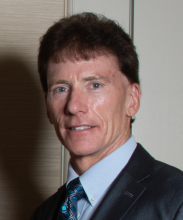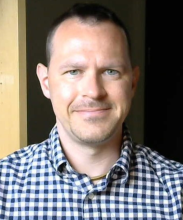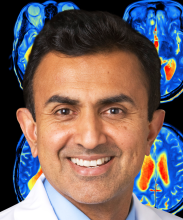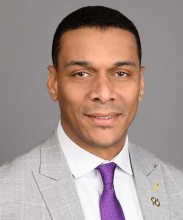About the Host

Dr. Nathaniel Chin is the creator and host of Dementia Matters. He is a geriatrician, memory clinic doctor, and medical director for the Wisconsin Alzheimer's Disease Research Center. His father's diagnosis with early onset Alzheimer’s disease inspired him to pursue a career as a geriatrician and scientist focused on dementia prevention, especially in regard to Alzheimer's disease.
Dementia Matters is a podcast about Alzheimer’s disease and other causes of dementia. Creator and host Dr. Nathaniel Chin interviews leading scientists and caregiving experts to bring listeners the latest in Alzheimer's disease news, research and caregiver resources.
Three Ways to Listen
You can listen to episodes through our website or subscribe to Dementia Matters through ApplePodcasts, Spotify, Podbean or wherever you get your podcasts. You can hear Dementia Matters on Fridays at 4 p.m. (CT) and again at 10 p.m. (CT) during the "Science Friday" segment on WMUU Radio, 102.9 FM in Madison, and streaming online.
Contact Us
Email your questions and episode suggestions to dementiamatters@medicine.wisc.edu.
Audio Editors: Eli Gadbury and Alexia Spevacek
Executive Producer: Caoilfhinn Rauwerdink
Producer: Amy Lambright Murphy
Make an Impact
Like what you’re hearing and learning? Make an impact when you make a tax-deductible gift to the Dementia Matters fund of the UW Initiative to End Alzheimer’s.
Recent Episodes

In the past few years, new therapies shown to slow the progression of Alzheimer's disease in people in the early stages of the disease have been making their way through the U.S. Food and Drug Administration’s (FDA) approval process. With these treatments now available, there are a growing number of questions surrounding who is eligible to take these medications and what processes are needed to ensure they are prescribed safely and effectively. Host Dr. Nathaniel Chin examines the guidelines for geriatricians and clinicians prescribing lecanemab and breaks down the eligibility requirements necessary to receive this treatment.

In 2017, the National Academies of Sciences, Engineering, and Medicine published a report showing promising but inconclusive evidence suggesting that interventions like cognitive training, blood pressure control and increased physical activity reduce a person’s risk for dementia, but what does the research show now? Dr. Luke Stoeckel from the National Institute on Aging (NIA) joins the podcast to share where the research on lifestyle interventions is at, why studies on these interventions are difficult to complete and more.
Guest: Luke Stoeckel, PhD, program director, Mechanistic and Translational Decision Science Program, Division of Behavioral and Social Research (DBSR), NIA


Dr. Paul Seidler joins the podcast to discuss his recent study looking at the connection between molecules in green tea and tau proteins. He also discusses the impact those molecules have on preventing cognitive decline and how these findings could lead to new strategies for treating Alzheimer’s disease.
Guest: Paul Seidler, PhD, assistant professor, University of Southern California Mann School of Pharmacy and Pharmaceutical Sciences

In May 2023, the U.S. Surgeon General, Dr. Vivek Murthy, released an advisory calling attention to the public health crisis of loneliness and social isolation in the U.S. With this widespread issue affecting such a broad population, how does social isolation impact older adults? Dr. Alison Huang joins the podcast to share insights from her study on the relationship between social isolation and the risk of dementia in older adults. Using data from a nine-year National Health and Aging Trends Study (NHATS), she discusses how factors like living alone, limited social networks and reduced activity participation contribute to increased dementia risk.
Guest: Alison Huang, PhD, MPH, senior research associate, Department of Epidemiology, Johns Hopkins Bloomberg School of Public Health

Six years following the start of Dementia Matters in October 2017, the podcast team turns the tables on our host, Dr. Nathaniel Chin. Producers Amy Lambright Murphy and Caoilfhinn Rauwerdink talk with Dr. Chin about how the podcast got started, the brain health tips he incorporates into his own life, how he envisions the field of Alzheimer’s disease research advancing in the next five years and other personal insights from the person behind the podcast.
Guest: Nathaniel Chin, MD, geriatrician, medical director, Wisconsin Alzheimer’s Disease Research Center, Wisconsin Registry for Alzheimer’s Prevention, host, Dementia Matters

Cognitive engagement is vital to keeping your brain healthy since it can slow shrinkage and induce neuroplasticity. While modern technology offers many new tools and games to keep your brain active, are they better than traditional puzzles like crosswords? Dr. Murali Doraiswamy of Duke University joins the podcast to talk about his recent study, in collaboration with principal investigator Dr. Dev Devanand of Columbia University, on the effects of daily crossword puzzles on the brain health of older adults in comparison to daily computerized games.
Guest: P. Murali Doraiswamy, MBBS, FRCP, director, Neurocognitive Disorders Program, physician scientist, Duke Institute for Brain Sciences, professor of psychiatry and medicine, Duke University School of Medicine, co-author, The Alzheimer’s Action Plan

Dementia caregiving is a multifaceted domain, deeply influenced by research, strategy and personal experiences. How are these elements shaping the current and future landscape of care? Dr. Beth Fields joins the podcast to discuss strategies and resources for caregivers from both national, state and personal perspectives, including the CHAT tool, the CAPABLE program and the National Strategy to Support Family Caregivers.
Guest: Beth Fields, PhD, board-certified occupational therapist, assistant professor, Department of Kinesiology, affiliate faculty member, Center for Aging Research and Education and Wisconsin Alzheimer's Disease Research Center, University of Wisconsin–Madison

Like cognition, mental health is a key component of the brain — and overall — health. In what ways can mental health and chronic mental illness impact a person’s cognition and risk for dementia? Dr. Art Walaszek joins the podcast to discuss the relationships between dementia and chronic mental illnesses, including major depression, bipolar disorder and schizophrenia in older adults.
Guest: Art Walaszek, MD, geriatric psychiatrist, professor, vice chair for education and faculty development, Department of Psychiatry, University of Wisconsin School of Medicine and Public Health

The 2023 Alzheimer's Association International Conference (AAIC) in Amsterdam brought together the world's leading scientists, clinical researchers, early career investigators, caregiving researchers and more to discuss the latest findings and advancements in dementia science. Dr. Percy Griffin joins the podcast to share key highlights from the conference. He discusses the use of CRISPR technology in Alzheimer's research, the significance of defining Alzheimer's by its biology rather than its symptoms and how the field is moving toward a precision medicine approach.
Guest: Percy Griffin, PhD, director of scientific engagement, Alzheimer’s Association

How can we ensure that all communities are represented in Alzheimer’s and related dementias research and have access to the latest treatments and interventions? Dr. Carl Hill, the chief diversity, equity and inclusion (DEI) officer for the Alzheimer's Association, joins the podcast to delve into the significance of representation, diversity, equity, equality and inclusion within Alzheimer's disease research. He discusses the challenges of underrepresentation in clinical trials, the importance of community-based participatory research (CBPR) and the social determinants of health that influence Alzheimer's risk.
Guest: Carl V. Hill, PhD, MPH, chief diversity, equity and inclusion officer, Alzheimer's Association
Agitation and Alzheimer’s: Strategies for Managing Behavioral and Psychological Symptoms of Dementia

Many people living with dementia experience behavioral symptoms alongside changes in their cognition. What can care partners and healthcare providers do to manage these behavioral changes? After leading the Wisconsin Alzheimer’s Disease Research Center’s (ADRC) annual Dr. Daniel I. Kaufer Lecture, Dr. Helen Kales joins the podcast to discuss agitation and other behavioral symptoms of dementia, the use of medications to manage these symptoms, and different caregiving approaches for addressing these behavioral changes in people living with dementia.
Guest: Helen Kales, MD, geriatric psychiatrist, Joe P. Tupin Endowed Professor of Psychiatry, Chair, Department of Psychiatry and Behavioral Sciences, University of California, Davis

Gina Green-Harris joins the podcast to discuss the importance of collaborating with communities in Alzheimer’s research. Sharing her experience as a researcher with the Wisconsin Alzheimer’s Institute (WAI) and the All of Us research program, she describes the key tenets of community engagement and explains ways researchers can build intentional, sustainable partnerships with communities throughout the research process This episode is part of a series featuring speakers from the National Alzheimer’s Coordinating Center’s (NACC) Fall 2022 ADRC Meeting, where the overarching theme was Diversity, Equity, and Inclusion (DEI) in ADRC research and operations.
Guest: Gina Green-Harris, MBA, director, Wisconsin Alzheimer’s Institute Regional Milwaukee Office, co-primary investigator, co-director, University of Wisconsin–Madison’s All of Us research program

The APOE gene is recognized as a significant genetic risk factor for cognitive decline, with different alleles, like APOE e2, being seen as protective against decline and others, like APOE e4, indicating an increased risk for cognitive decline. However, new studies are looking at whether these trends are universal across different racial and ethnic groups. Dr. Cally Xiao joins the podcast to discuss her study, which focuses on how different APOE alleles affect risk for Alzheimer’s disease within Hispanic populations compared to non-Hispanic populations.
Guest: Cally Xiao, PhD, Project Specialist, Global Alzheimer’s Association Interactive Network, Laboratory of Neuro Imaging, University of Southern California

On July 6, 2023, the U.S. Food and Drug Administration (FDA) granted full approval for the Alzheimer’s disease drug Leqembi (lecanemab-irmb), the first medicine shown to delay the course of the disease. Having gone through a rigorous approval process, the medication exemplifies a critical advancement in the ongoing battle to treat Alzheimer’s disease. Having already prescribed the treatment to real-life patients, Dr. Robert Przybelski joins the podcast to discuss his experience prescribing and administering lecanemab, what clinicians and patients should discuss when considering these treatments, and what is needed to integrate these treatments into the healthcare system.
Guest: Robert Przybelski, MD, MS, director, Geriatric Memory Clinics, UW Health, professor, Division of Geriatrics and Gerontology, University of Wisconsin School of Medicine and Public Health

Dr. Crystal Glover, health equity in aging researcher at Rush Alzheimer’s Disease Center, joins the podcast to discuss the importance of increasing brain donations and tissue samples from older adults of underrepresented backgrounds. Dr. Glover talks about the reasons why participants may be interested in brain donations, the barriers that they may face, and the benefits of combining both qualitative and quantitative data within her research. This episode is part of a series featuring speakers from the National Alzheimer’s Coordinating Center’s (NACC) Fall 2022 ADRC Meeting, where the overarching theme was Diversity, Equity, and Inclusion (DEI) in ADRC research and operations.
Guest: Crystal Glover, PhD, leader, Outreach, Recruitment, and Engagement Core, Rush Alzheimer’s Disease Center, Associate Professor, Department of Psychiatry and Behavioral Sciences, Division of Behavioral Sciences, Rush Medical College

On June 9, 2023, the Food and Drug Administration’s (FDA) advisory committee unanimously voted to approve lecanemab, moving the treatment one step closer to full FDA approval. In the lead up to the FDA’s official announcement expected in early July, Dr. Paul Aisen joins the podcast to discuss Alzheimer’s disease clinical trials. Aisen, the founding director of the Alzheimer’s Therapeutic Research Institute (ATRI) and a leading figure in Alzheimer’s disease research for over three decades, talks about the Phase 3 clinical trials for lecanemab and gantenerumab and shares highlights from the 2022 Clinical Trials on Alzheimer’s Disease (CTAD) conference.
Guest: Paul Aisen, MD, professor of neurology, Keck School of Medicine, University of Southern California, Director, Alzheimer’s Therapeutic Research Institute

Dr. Lisa Barnes joins the podcast to discuss her research focusing on how social determinants of health, specifically racial differences, affect chronic diseases of aging.She explains the difference between equality, equity and justice, and the different drivers of disparities within the medical field. This episode is part of a series featuring speakers from the National Alzheimer’s Coordinating Center’s (NACC) Fall 2022 ADRC Meeting, where the overarching theme was Diversity, Equity, and Inclusion (DEI) in ADRC research and operations.
Guest: Lisa Barnes, PhD, Alla V. and Solomon Jesmer Professor of Gerontology and Geriatric Medicine, Rush University Medical Center, neuropsychologist, Rush Alzheimer’s Disease Research Center


Dr. Sarah Biber, the program director for the National Alzheimer’s Coordinating Center (NACC), joins the podcast to discuss efforts to increase representation and equitable practices across the 37 Alzheimer’s Disease Research Centers (ADRCs). She discusses key disparities in Alzheimer’s disease research, why diversity and inclusion are imperative in research, and what is being done to address these disparities with the data collected from research participants. This episode is the first of an upcoming series featuring speakers from the Fall 2022 ADRC Meeting, where the overarching theme was Diversity, Equity, and Inclusion (DEI) in ADRC research and operations.
Guest: Sarah Biber, PhD, program director, National Alzheimer’s Coordinating Center

Recorded live from the Wisconsin ADRC’s Alzheimer’s Disease & Related Dementias Research Day, Dr. Nathaniel Chin discusses the importance of mentorship and the future of neuroscience and Alzheimer’s disease research with the Alzheimer’s Association International Conference® (AAIC) Neuroscience Next 'One to Watch' award recipients and the event’s organizers.
Guests: Barbara Bendlin, PhD, director, UW-Madison Neuroscience and Public Policy Program, leader, Research Education Component (REC), Wisconsin Alzheimer’s Disease Research Center; Claire Sexton, DPhil, senior director of scientific programs and outreach, Alzheimer’s Association; Nadia Dehghani, BS, co-chair, Neuroscience Next Scientific Program Committee; Claire André, PhD, postdoctoral fellow, Center for Advanced Research in Sleep Medicine, Université de Montréal; Chinmayi Balusu, founder, CEO, Simply Neuroscience; Kacie Deters, PhD, assistant professor, University of California Los Angeles; Kao Lee Yang, MPA/PhD candidate in the Neuroscience and Public Policy Program, University of Wisconsin–Madison

Dr. Natascha Merten joins the podcast to discuss her study focused on trends in cognitive function across generations. Merten also explains her research on the associations between sensory and motor functions and blood-based biomarkers for neurodegeneration and dementia.
Guest: Natascha Merten, PhD, MS, director, Beaver Dam Offspring Study-Neurocognitive Aging Study, assistant professor, Departments of Population Health Sciences and Medicine, University of Wisconsin–Madison

Dr. Annalise Rahman-Filipiak joins the podcast to discuss her research focused on disclosing neuroimaging biomarkers across diverse populations. She addresses why some people might want to know their biomarker results, while others might not, and how careful disclosure of these results to at-risk individuals may help prepare them and their families for the future through personalized treatment, research engagement, advanced planning and emotional support.
Guest: Annalise Rahman-Filipiak, PhD, assistant professor, neuropsychologist, department of psychiatry, University of Michigan

For families and dementia care partners, palliative care can help improve the quality of life for their loved ones and themselves by addressing physical and emotional needs. However, starting conversations around end-of-life care and planning can be difficult. Dr. Elizabeth Bukowy joins the podcast to explain the difference between palliative and hospice care, share how families and care partners can start these challenging conversations, and discuss why these discussions are essential for quality of life.
Guest: Elizabeth Bukowy, DO, CMD, assistant professor, Medical College of Wisconsin Division of Geriatrics; medical director, Lutheran Home and Congregational Home

When seeking medical information and treatment, different racial and ethnic groups may require specially tailored information to relate to, understand and apply to their own experiences. In this episode, Dr. Fayron Epps joins the podcast to talk about the unique experiences of African American caregivers and her lab's work to provide education and assistance to their needs. Epps seeks to promote quality of life for families affected by dementia through research, education and service. This episode is part of a special three-part series highlighting speakers from the Wisconsin Alzheimer’s Institute’s 20th Annual Update in Alzheimer’s Research and Related Dementias.
Guest: Fayron Epps, PhD, RN, FGSA, FAAN, assistant professor, Nell Hodgson Woodruff School of Nursing, Emory University, principal investigator, Faith Village Research Lab, founder, Alter




